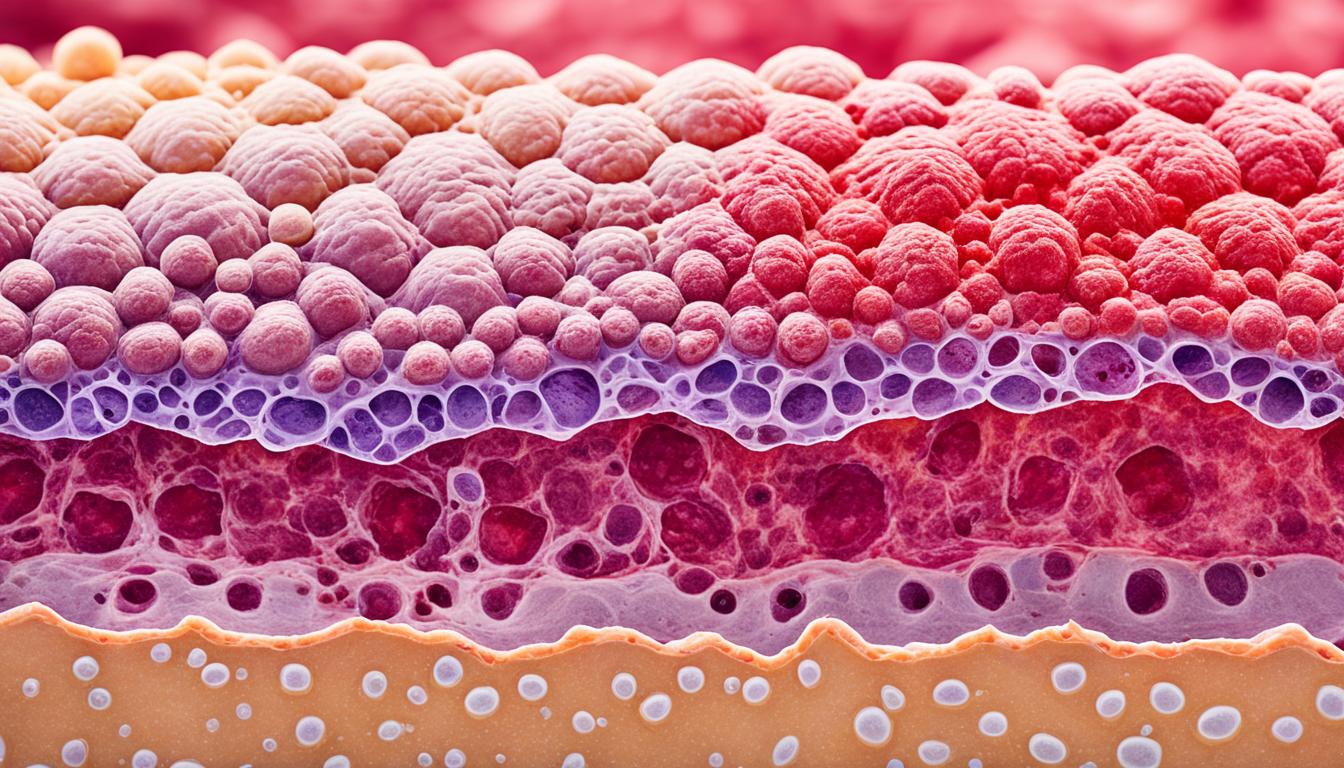We’re going to examine cancer squamous cell disease in this part. We’ll look at its symptoms, causes, and how it’s diagnosed. We’ll also discuss the use of stem cell therapy. Cancer stem cells (CSCs) are key in how squamous cell carcinoma (SCC) and other cancers form. It’s important to know about CSCs to find better treatments.
SCC is a type of skin cancer from abnormal squamous cells. It can show up on the skin, lips, mouth, esophagus, and genital areas. Like with any cancer, SCC can spread and become hard to treat. That’s why it’s vital to learn about the role CSCs play in its growth.
We will compare CSCs in SCC and normal skin stem cells. This comparison helps researchers understand SCC better. We’ll also talk about new discoveries in CSC research. And, the hurdles in developing treatments specific to CSCs in SCC.
Key Takeaways:
- Squamous cell carcinoma (SCC) is a type of skin cancer that comes from abnormal squamous cells.
- Cancer stem cells (CSCs) are key in SCC’s start and growth.
- It’s vital to understand CSCs in SCC for better treatments.
- Comparing CSCs in SCC with normal skin stem cells can provide insights into the disease.
- Today’s progress in CSC research opens doors for new treatments for SCC.
Understanding the Risk Factors and Symptoms of Squamous Cell Carcinoma
Squamous cell carcinoma (SCC) happens because of a genetic mutation. This mutation comes from being in sunlight and UV light. This type of skin cancer grows when skin cells are damaged by UV light over time.
Being around cancer-causing substances, like arsenic, and some work toxins, can also raise the risk. Severe skin burns increase the chance of getting SCC too.
Some HPV types can make getting SCC more likely, especially near the genitals. HPV is spread through sex. It can change skin cells, making them more likely to turn cancerous.
Knowing SCC’s signs is key for finding it early. Symptoms vary by where the cancer is and how advanced it is. Look out for:
- Abnormal bleeding
- Difficulty swallowing
- Chronic fever
- Changes in urine or stool
- Hoarse voice or chronic cough
- Body aches or bone pains
- Slow-healing wounds
- Lumps in the neck or other body parts
- Unexplained weight loss
- Fatigue
- Abnormal vaginal bleeding
These signs might not just be SCC. But, if they last or get worse, seeing a doctor is a must.
Finding SCC early boosts treatment success. Early-stage SCC can often be cured. Treatments include surgery, radiation, and targeted therapies. Keep your skin safe with sunscreen and cover-ups to lower the SCC risk.
Diagnosis, Treatment, and Management of Squamous Cell Carcinoma
The diagnosis of squamous cell carcinoma (SCC) involves a skin biopsy. This is done when a suspicious patch of skin is found. A doctor takes a small piece of the skin and looks at it under a microscope. This helps tell if it’s cancer. Finding SCC early is very important for the best chances of treatment working.
Treating squamous cell carcinoma usually involves surgery, radiation therapy, and sometimes more treatments. Surgery is often the first choice for removing SCC. Mohs micrographic surgery is a special kind of surgery used for SCC on the face and neck, or high-risk spots. It aims to remove the tumor while saving as much healthy skin as possible.
If surgery isn’t an option, or to make sure all of the cancer is gone, radiation therapy is used. It sends strong beams of energy at the cancer. Sometimes, both Mohs micrographic surgery and radiation therapy are used together. This can provide the best results for advanced cases of SCC.
To manage squamous cell carcinoma over time, regular doctor check-ups and some lifestyle changes are key. Seeing a dermatologist or cancer doctor for routine exams is important. You should also protect your skin from the sun, wear protective clothes, use high SPF sunscreen, and skip tanning beds. These steps can help prevent SCC from coming back, or from happening in the first place.

